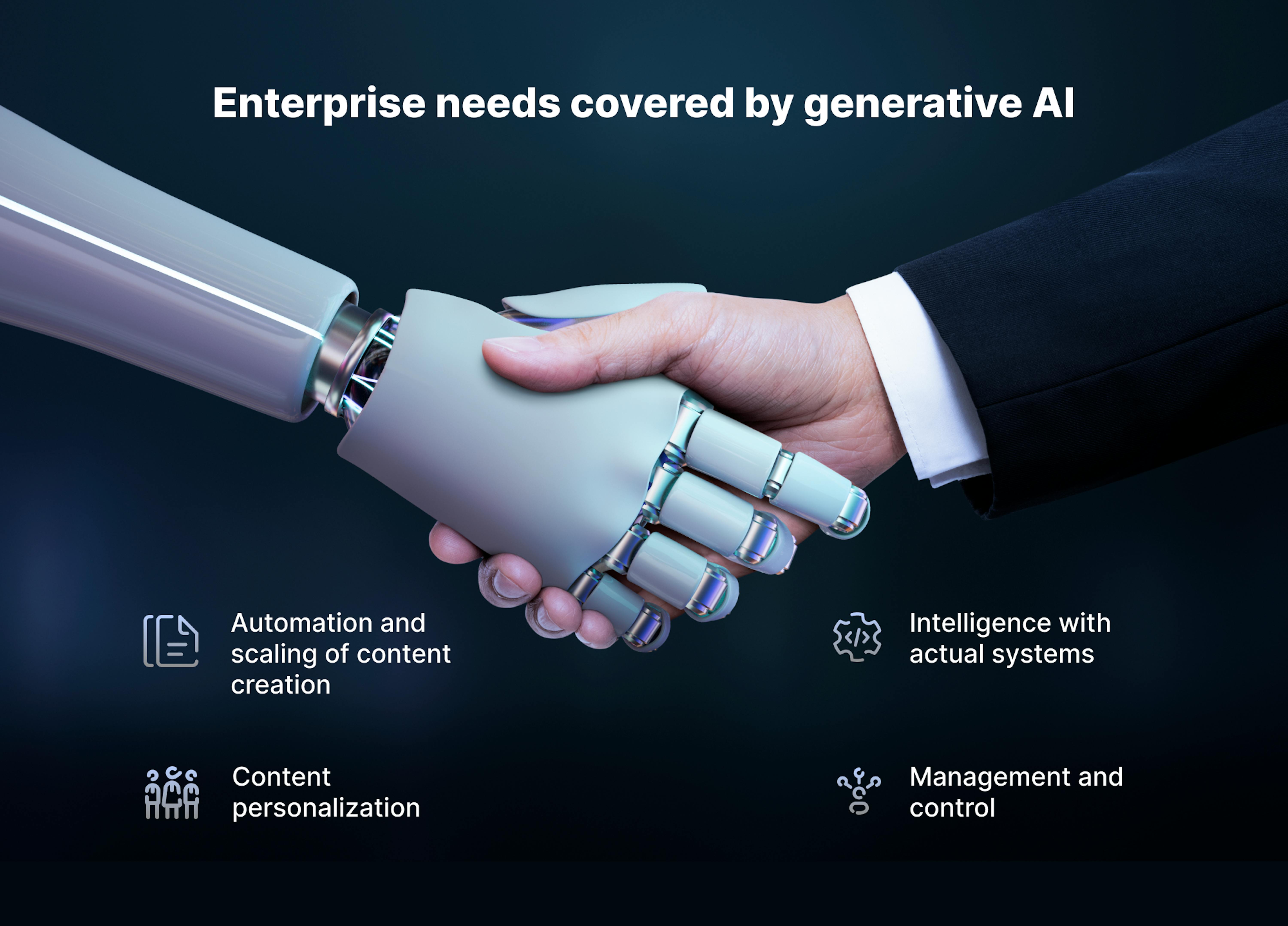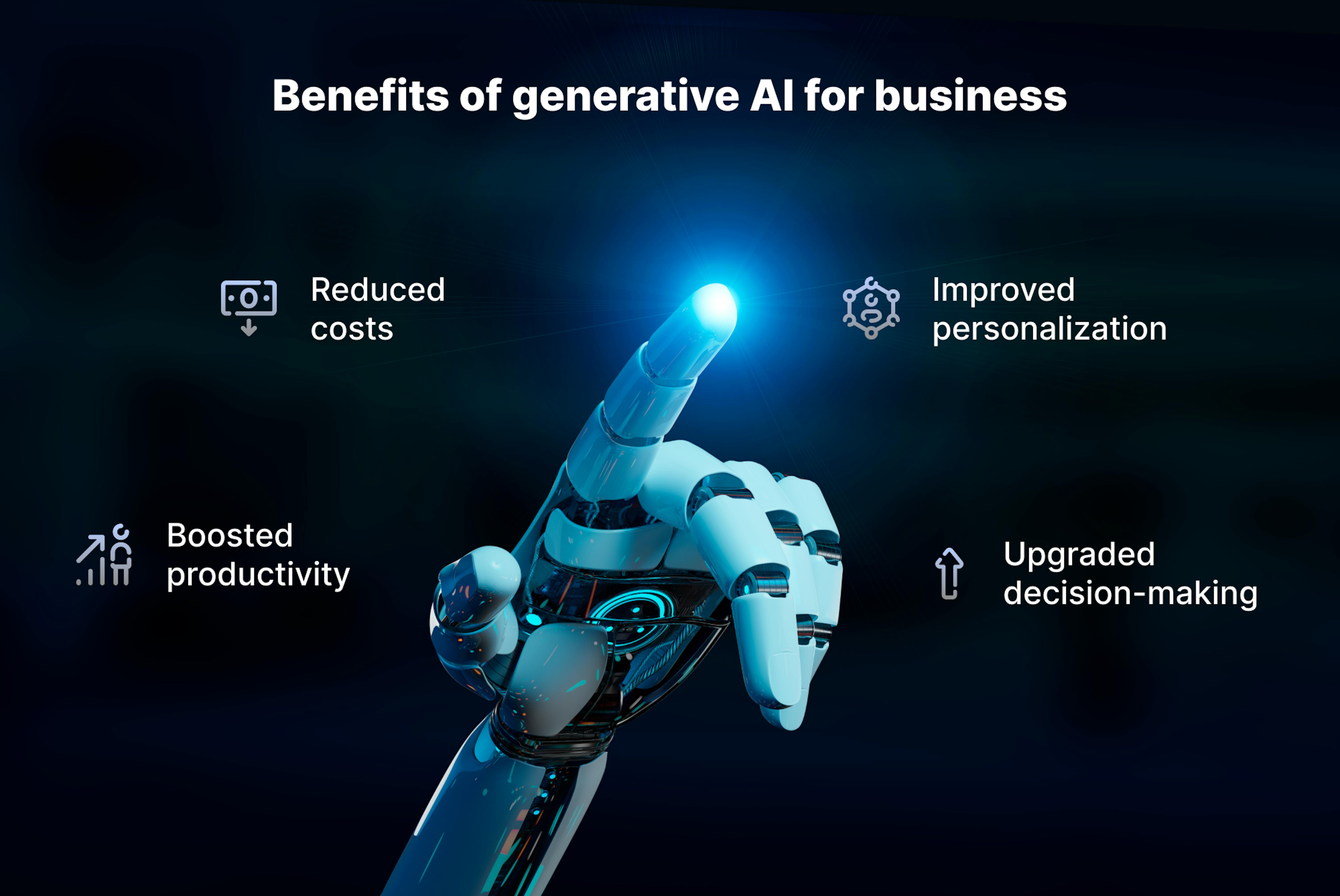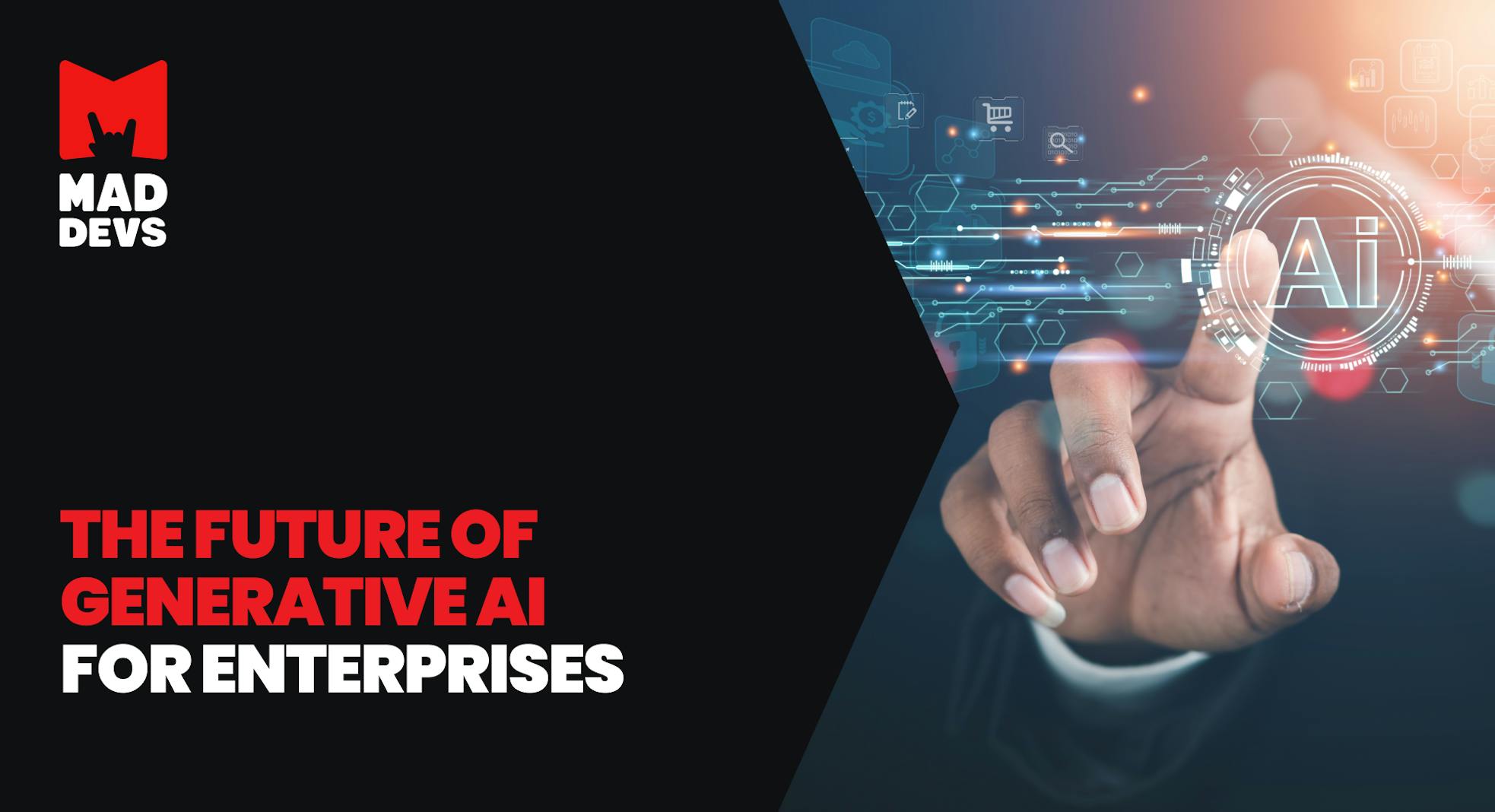Generative AI has already revolutionized many processes across a wide variety of industries. While a few years ago, the first startups seemed to many to be "toys" for individual users, now more and more such startups are appearing and offering powerful tools for entire enterprises, which have already become an integral part of their working infrastructure.
Today, we will take a look at the current state of this market. What are the leading generative development startups, and what is their place on the market? What needs are they helping enterprises to cover? Are there challenges to their implementation? What role does it have for the future of enterprises?
All these answers are in our article. Enjoy your reading.
Generative AI is a specific field within artificial intelligence that focuses on machines’ capability to create new content, ranging from text and code to voice, images, videos, processes, and even complex 3D structures. Over the past decade, some aspects of Generative AI have made significant strides, but it was the introduction of large language models (LLMs) with easily accessible chat interfaces.
Enterprise needs covered by generative AI
Every company has to fulfill many needs to stay relevant and competitive in the market, meet the demands of its customers, and make the right decisions. Let's look at which of these needs generative AI technology is already helping to cover.

Automation and scaling of content creation
In the digital age, corporations face immense pressure to create large volumes of content for marketing, training, internal communication, and many other purposes. This can be resource-intensive and time-consuming, especially when there's a constant need for content updates and optimization. Generative AI revolutionizes this process, enabling the automation and scaling of content creation. It can quickly create and adapt content for various platforms and audiences, freeing up time for other tasks.
Content personalization
Today's corporations aim for deeper personalization in their marketing and sales strategies. However, providing unique and adaptive content for each client can be complex and laborious. Generative AI can help overcome this problem by creating high-quality, personalized content on a large scale, including offers, advertising, product recommendations, and more.
Intelligence with actual systems
Now businesses rely on many technological systems, from CRM to ERP or analytics and data management platforms. Generative AI offers unique capabilities to enhance the efficiency of these systems. It can analyze vast amounts of data, delivering intricate analytical reports previously inaccessible or requiring significant resources. As a result, businesses can optimize their operational processes, making them more flexible and adaptable to the ever-changing market conditions.
📖 Transform your approach to CRM with insights from our article! Learn how AI enhances customer engagement, offers significant business benefits, and what potential drawbacks you should be aware of.
Automation and proactive management
When businesses are expanding, and operations are becoming more intricate, the need for precise management and control has never been more paramount. Companies seek ways to ensure that every decision is informed, an operation is overseen, and every outcome is as predicted. Generative AI provides tools that enhance managerial oversight, ensuring that operations run smoothly. By offering predictive insights and automating routine tasks, generative AI ensures that leaders are always in control, making decisions that are not just informed but also forward-thinking.
Enterprise challenges in adopting generative AI
Of course, it cannot be ignored that the introduction of generative AI is a fundamentally new approach and can create its own complexities, affecting the processes of communication, production, and so on. Let's review the most frequent challenges.

AI training and acceptance
Incorporating generative AI into corporate structures requires not only a technical infrastructure update but also a reevaluation of organizational processes and work approaches. Changes may meet resistance from staff, who may be anxious about the potential impact of AI on their roles and responsibilities. Furthermore, successful implementation requires staff training, which demands time and resources.
Proving ROI
Measuring the return on investment in AI can be complicated, as many benefits, such as process efficiency improvement or increased customer satisfaction levels, may be hard to convert into specific financial metrics. Moreover, AI investments often start paying off only after a prolonged period, requiring strategic and long-term thinking from companies.
Data accuracy and quality
Generative AI requires large volumes of high-quality data for training and generating useful and accurate content. However, data management can be a complex task. Incorrect, incomplete, or biased data can reduce the accuracy and usefulness of AI conclusions, lead to algorithm bias, and even result in legal liability.
Data security and privacy
Using AI involves processing large amounts of data, including sensitive and personal data. This presents significant challenges in ensuring data security and confidentiality. Companies must implement stringent security measures and comply with data processing regulations.
AI ethics and responsibility
With the increasing adoption of AI across various sectors, intricate questions related to ethics and responsibility emerge. The transparency of decisions made by AI systems and the capability to elucidate these decisions become particularly pertinent.
From a legal perspective, the ambiguity of AI-driven decisions can pose risks of non-compliance with existing regulations. For instance, the European Union's General Data Protection Regulation (GDPR) encompasses the "right to explanation," allowing individuals to demand clarifications for automated decisions made about them. The Algorithmic Accountability Act proposes that companies conduct impact assessments of their high-risk AI systems in the US. Biases in AI, whether unintentional or a byproduct of training data, can lead to discriminatory outcomes, potentially violating such regulations. Moreover, specific AI-related laws are actively being developed in various countries, and companies must stay updated to ensure their AI systems align with these standards.
Investments in generative AI
Investments in the field of generative AI are growing at an unprecedented pace. According to PitchBook data, in 2022, generative AI startups attracted $4.5 billion in investments, and this figure saw a significant increase in 2023, exceeding $12 billion in the first quarter alone. Additionally, as per CB Insights, by the second quarter of 2023, equity funding for generative AI startups had already surpassed $14.1 billion across 86 deals.
This rapid growth indicates that funding for the generative AI sector during the first half of 2023 has grown over five times compared to the entire year of 2022, with 18 companies already becoming unicorns. Among the companies that secured the largest investments this year are OpenAI, with $10 billion; Inflection specializing in human-computer interfaces with $1.3 billion; and Anthropic, an AI model developer with $850 million.
Despite these impressive figures, the generative AI space is still in its early stages. Out of over 360 identified generative AI companies, 27% have yet to secure any outside equity funding, and over half are at the Series A stage or earlier, indicating the immense growth potential.
Sequoia Capital has emerged as the most active investor in the generative AI space since 2017, having invested in more generative AI startups than any other investor. Other significant investors include Andreessen Horowitz and Khosla Ventures.
The future of investments in generative AI looks promising, with the technology poised to revolutionize various sectors and create new opportunities for businesses and investors alike.
Leading startups
Let's start with startups whose products are widely accessible to the general public. They can be useful to regular users for work purposes, to researchers and developers for experiments, but also to enterprises for integrating AI into their processes and improving their operations.
OpenAI
| OPEN AI | |
|---|---|
| Year | 2017 |
| Location | San Francisco, California, United States |
| Funding round | 8 |
| Total funding amount | $11.3B |
| Products | GPT-4, DALL-E, OpenAI Five, ChatGPT, OpenAI Codex. |
| Enterprise needs | Automation and scaling of content creation; Content personalization. |
OpenAI is a leading player in the field of generative AI. The company is known for its breakthrough language models, including GPT-3 and GPT-4, which have significantly advanced the boundaries of AI capabilities. OpenAI strives to democratize AI and its accessibility to the public. This approach has attracted significant attention and praise.
OpenAI also aims to create safe artificial general intelligence (AGI) that will benefit all of humanity. They research generative models and ways to align them with human values and actively work on AI governance to ensure safety and accountability in using their technologies.
Among the main technologies, products, and services they offer to businesses to overcome various challenges is their API, which provides access to their latest models and guides on best safety practices. This allows developers to integrate OpenAI's advanced language models into their applications and services.
Key models include GPT-4, which has a broad general knowledge and specialized expertise, allowing it to follow complex instructions in natural language and solve complex tasks.
DALL·E 2 is another notable system that can create original, realistic images and art from a text description. It can combine concepts, attributes, and styles, which also makes it a powerful tool for content creation.
It is also worth mentioning Whisper, a universal speech recognition model that can transcribe, identify, and translate a multitude of languages.
Hugging face
| HUGGING FACE | |
|---|---|
| Year | 2016 |
| Location | New York, New York, United States |
| Funding round | Series C |
| Total funding amount | $160.2M |
| Products | Transformers library, Tokenizers library, Hub Python Library. |
| Enterprise needs | Intelligence with actual systems; Management; and control. |
Originally involved in developing chatbots, Hugging Face has now become a hub for the machine learning community, providing a platform for collaboration on models, datasets, and applications.
The company aims to simplify and speed up AI development and research and help overcome challenges associated with access to quality models and datasets. This allows companies and researchers to focus on solving specific problems and innovations rather than creating basic tools and resources.
Hugging Face offers a variety of technical solutions. They provide the Transformers library, which offers pre-trained PyTorch, TensorFlow, and JAX models. This allows developers to integrate cutting-edge AI models into their applications and services easily.
In addition, Hugging Face provides the Tokenizers library for fast and efficient text tokenization, which is a key step in most natural language processing tasks.
Finally, they offer the Hub Python Library, which allows for managing repositories directly from the Python runtime environment, simplifying the process of exchanging models and datasets.
Stability AI
| STABILITY AI | |
|---|---|
| Year | 2019 |
| Location | London, England, United Kingdom |
| Funding round | Convertible Note |
| Total funding amount | $123.8M |
| Products | Stable Diffusion, DreamStudio, Clipdrop, and Plugins. |
| Enterprise needs | Intelligence with actual systems; Management; and control. |
Stability AI is a leading company in the field of generative AI, specializing in the creation of open-source machine learning models.
One of the main challenges Stability AI seeks to overcome is utilizing the potential of AI to generate and interpret visual art, visualize complex scientific data, and use these machine learning models to work with information, biology, medicine, and other fields.
They provide APIs for their models and enable companies and individual developers to integrate them into their own applications and services.
Also, Stability AI offers a number of products, including DreamStudio and Clipdrop, which use these models to provide functionality for creating new and unique designs and provide an ecosystem of applications, plugins, and resources for all creators.
Additionally, they provide plugins for Photoshop and Blender, which allow for the generation and editing of images using their Stable Diffusion model right within these programs.
Enterprise level startups
Now let's talk about startups that directly work for the enterprise. They typically specialize in more complex tasks, such as pharma companies developing drugs, big data analytics for process transparency and informed decision-making, streaming companies for automated analysis, transcribing and formatting of abundant audio content, marketing companies for automating and personalizing the creation of marketing videos, and other time- and effort-consuming tasks, especially when you consider companies' scale.
DeepMind
| DEEPMIND | |
|---|---|
| Year | 2010 |
| Location | London, England, United Kingdom |
| Funding round | Series A, Acquired by Google |
| Total funding amount | Unknown |
| Products | AlphaGo, AlphaStar, AlphaFold, AlphaZero. |
| Enterprise needs | Intelligence with actual systems, Management; and control. |
Founded in 2010 and later acquired by Google in 2014, DeepMind is a pioneer who strives to create AI systems that can improve many aspects of our world, from scientific discoveries to solving global problems. Therefore, DeepMind holds a key position in generative AI, using its advanced research to create models that can generate new ideas and solutions across industries.
The primary challenge DeepMind faces is the creation of AI systems capable of solving complex tasks that typically require two things: human intelligence and developing deep learning algorithms that can be used for process optimization and decision-making in enterprises, expanding the capabilities of creative expression and scientific discovery.
One of their key developments is AlphaFold, a machine-learning model that can predict the 3D structure of a protein with accuracy comparable to experimental methods. This opens up new possibilities in biology and medicine, allowing scientists to understand proteins better and develop new drugs.
Additionally, DeepMind has developed models such as MuZero and AlphaZero, which can learn without predefined parameters, demonstrating their adaptability, and can be applied in various fields, from manufacturing optimization to creating smart cities.
Glean
| GLEAN | |
|---|---|
| Year | 2019 |
| Location | Palo Alto, California, United States |
| Funding round | Series C |
| Total funding amount | $155M |
| Products | Transformers library, Tokenizers library, Hub Python Library. |
| Enterprise needs | Intelligence with actual systems; Management; and control. |
Glean develops solutions for enterprise knowledge discovery and uses generative AI to create intuitive and powerful search tools.
Glean thus aims to overcome the complexity of searching for and extracting information from various data sources within the enterprise. This includes searching documents, conversations, tickets, and more.
Additionally, they aim to provide full source attribution so that users can delve deeper and understand where answers come from. The company also strives to ensure the reliability and security of its AI solutions so that customers can trust their search results.
For this, Glean's solution continuously learns from your company's unique language and context to improve search relevance, eliminating the need for manual tuning.
They also offer personalized results and knowledge discovery, building a knowledge graph of the company and understanding people, content, and interactions so that every result is personalized.
Jasper AI
| JASPER AI | |
|---|---|
| Year | 2015 |
| Location | Montréal, Quebec, Canada |
| Funding round | Series A |
| Total funding amount | $131M |
| Products | Jasper AI Engine |
| Enterprise needs | Automation and scaling of content creation; Content personalization. |
Jasper AI utilizes artificial intelligence technologies to create intuitive tools for generating marketing materials.
They help simplify and expedite the content creation process for teams who work on large projects or have limited resources. In addition, they aim to help teams maintain a consistent brand tone and style across all content, which can be challenging to achieve without the right tools.
For this, they developed Jasper's AI Engine, a tool that utilizes top-tier AI models, including OpenAI's GPT-4, Anthropic, and Google models, to create content that aligns with the brand.
Also, Jasper AI offers intuitive tools like Jasper Everywhere, an extension that allows users to use Jasper anywhere they create content online, and Jasper Brand Voice, a tool that helps brands train Jasper in their style and tone.
Tabine
| TABINE | |
|---|---|
| Year | 2013 |
| Location | Tel Aviv, Tel Aviv, Israel |
| Funding round | Unknown |
| Total funding amount | $32.1M |
| Products | Tabnine AI Assistant with the integration to IDEs. |
| Enterprise needs | Intelligence with actual systems. |
Tabnine, an AI assistant for software developers, is becoming a key player in generative AI and offering unique solutions to developers worldwide.
Tabnine aims to simplify and expedite the coding process for developers and make it more efficient and error-free by offering tools that automatically suggest code based on the context in which the developer is working.
So, Tabnine has developed a tool that uses generative AI models to suggest code to developers in real time. This tool supports over 30 programming languages and integrates with most popular Integrated Development Environments (IDEs). It uses advanced machine learning algorithms to train millions of open-source codes and can suggest code that aligns with the developer's style and code context.
Tome
| TOME | |
|---|---|
| Year | 2020 |
| Location | San Francisco, California, United States |
| Funding round | Series B |
| Total funding amount | $75.3M |
| Products | Tom App AI storytelling platform |
| Enterprise needs | Content personalization; Automation; Scaling of content creation. |
Tome is an AI-powered storytelling platform that allows the automatic creation of new slides, formatting, and adding visual elements.
The company aims to help shape and convey ideas easily, quickly, and without losing nuances and helping to convey your point of view convincingly.
Their platform provides features that help improve the tone and phrasing of writing, create suitable illustrations, and even search for necessary references across the web to animate and back up the story as needed by the company or project. Furthermore, Tome can help quickly and easily transform already prepared documents, supplementing them with all of this based on the existing text.
AssemblyAI
| ASSEMBLY AI | |
|---|---|
| Year | 2017 |
| Location | San Francisco, California, United States |
| Funding round | Series B |
| Total funding amount | $63.1M |
| Products | Conformer-2, Audio Intelligence models, LeMUR, API. |
| Enterprise needs | Intelligence with actual systems; Management; And control. |
AssemblyAI develops AI solutions for processing audio data, extracting needed information, and converting it to other useful formats.
So they strive to assist businesses and organizations in addressing problems related to analyzing and processing audio data and offer solutions for automatic transcription, speech summarization, speaker identification, and much more. This is especially beneficial for companies dealing with large volumes of audio data, such as telecommunications services, video platforms, and virtual meetings.
They have developed a series of AI models, including the Conformer-2 speech recognition model, which provides high accuracy on a wide range of academic and real-world datasets.
They also offer a suite of Audio Intelligence models that can summarize, determine mood, moderate content, hide personal information, and much more. In addition, they introduced LeMUR, a new platform for building LLM-based applications using audio data.
Their API processes terabytes of audio data daily with over 99.9% uptime and success rate and meets SOC 2 Type 2 requirements.
Rephrase AI
| REPHRASE AI | |
|---|---|
| Year | 2019 |
| Location | San Francisco, California, United States |
| Funding round | Seed |
| Total funding amount | $12.2M |
| Products | Rephrase Studio. |
| Enterprise needs | Content personalization; Automation; And scaling of content creation. |
Rephrase AI offers a platform for generating text-to-video content and creating unique and personalized content using digital avatars.
They aim to simplify the video creation process by eliminating the complexities associated with traditional video production. By transforming text into video in just a few minutes, Rephrase AI appeals to many clients, including brands, agencies, and influencers, helping them create compelling and personalized content that can engage and retain audience attention.
The company’s primary technical solution is the Rephrase Studio platform for converting text into video, offering a wide selection of digital avatars that can be customized according to user requirements. Users can input their message, which is then transformed into a unique and professional-looking video without requiring a team of cameramen and editors.
Runway AI
| RUNWAY AI | |
|---|---|
| Year | 2018 |
| Location | New York, New York, United States |
| Funding round | Series C |
| Total funding amount | $236.5M |
| Products | Gen-1 and Gen-2 generative AI models, AI Magic Tools. |
| Enterprise needs | Automation and scaling of content creation; Content personalization. |
Runway AI provides a powerful platform for video editing based on generative AI.
Their mission is to create multimodal AI systems to open a new era of creativity. They aim to overcome the challenges associated with consistently creating new content and assist creators in bringing their ideas to life with tools that can help create new videos, images, and other forms of content, making the creative process simpler and more accessible.
For this purpose, Runway AI has developed Gen-1 and Gen-2, two generative AI models that can create new videos and images based on input data.
In addition, the startup offers AI Magic Tools, a set of tools that can be used for creating, editing, and enhancing content. These tools, including functionalities such as Text to Image, Image to Image, Infinite Image, Inpainting, and Frame Interpolation, can be used in various industries, including entertainment, education, advertising, and anywhere where the constant creation of unique and high-quality content is critically important for the company's success.
Wrapping up
Most of these firms are barely five years old, yet they're already commanding significant attention and making a substantial impact across all industries. We've spotlighted a few leaders, but in reality, there are many more with immense commercial and technological potential. Moreover, new players are entering the scene monthly, accelerating market evolution at an unprecedented pace.
Future of generative AI for enterprises
Being on the cusp of this next technological revolution is incredibly exhilarating. The true scale of its impact is challenging to predict with certainty, given the propensity for both overestimation and underestimation. However, the offerings already available in the market are here to stay and will continue to evolve in one way or another, allowing us to draw some preliminary conclusions.

For example, based on an article from the Harvard Business Review, the following key points can be made about how generative AI can change the future of enterprises.
Generative AI as a driver of changes in software interaction
It is set to revolutionize the way we interact with software. As it becomes more integrated into systems, we can anticipate a shift towards more intuitive and personalized interfaces. These interfaces will adapt to individual users' specific needs and preferences, thereby enhancing user interaction and customer satisfaction.
Generative AI as a tool for personalization
Its ability to generate various forms of content, including text, speech, images, music, video, and code, is a game-changer. This capability, combined with user-specific information, simplifies task execution and significantly expands software accessibility. The result is the potential for creating more flexible and adaptive systems that can handle larger volumes of data and provide more accurate and beneficial outcomes.
Generative AI as a competitive differentiator
It will serve as a brand's key differentiator in the competitive landscape. Its integration into various aspects of a business can lead to the development of unique value propositions that enhance competitiveness. This could manifest in innovative products, services, or customer experiences that set a brand apart from its competitors.
Generative AI as a catalyst for business transformation
It will be pivotal in how businesses adapt their operational processes, business models, and customer relationships to the new technological era. This could lead to the emergence of more efficient and automated processes that reduce costs and increase productivity. Furthermore, it could spur innovation and growth by opening up new opportunities and avenues for businesses to explore.
Summary
We've delved into the dynamic world of generative AI, exploring its growing influence in the enterprise sector. So now you know much more about startups leading the charge in this space and the unique solutions they provide to meet your business needs. We've also addressed the challenges of implementing these innovative technologies and underscored the transformative potential of generative AI, outlining its future role in reshaping your business operations, competitive dynamics, and customer relationships.
If you still have questions or need to implement or develop AI-based solutions in your business, you can trust our experience and book a free consultation with our experts. They will research your business, its features, and goals to offer the most effective and profitable solutions for its intelligent transformation.








